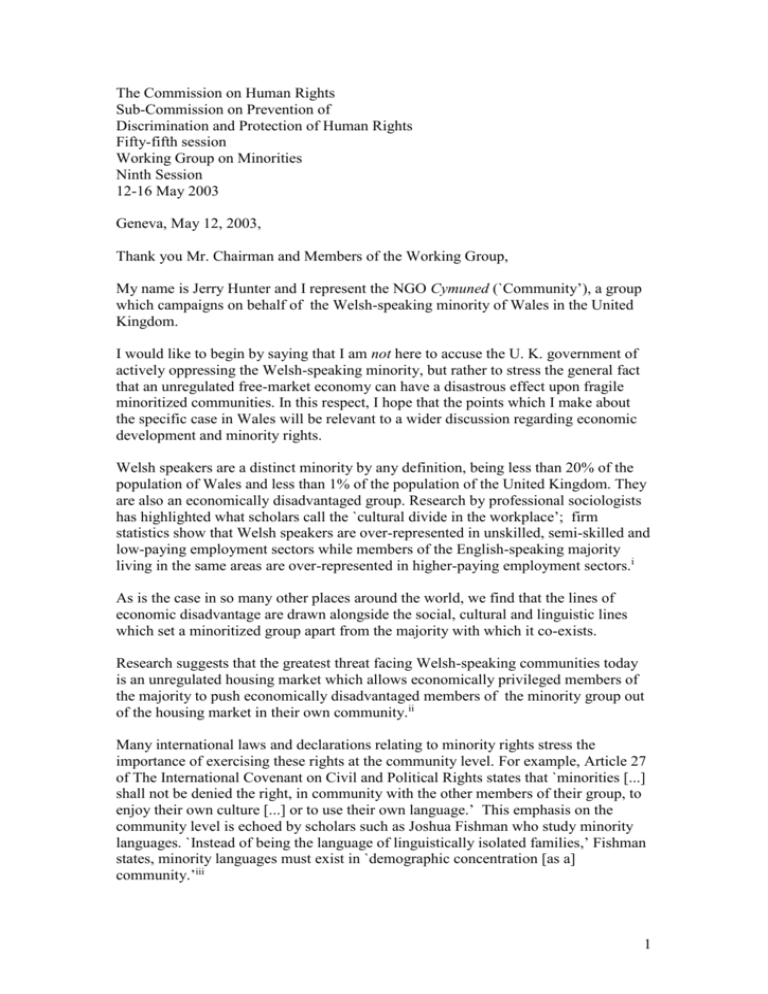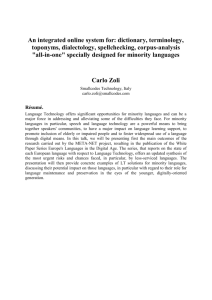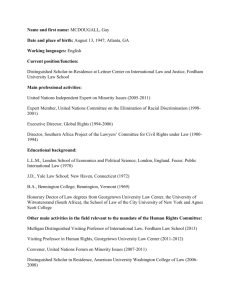NGO Cymuned (`Community
advertisement

The Commission on Human Rights Sub-Commission on Prevention of Discrimination and Protection of Human Rights Fifty-fifth session Working Group on Minorities Ninth Session 12-16 May 2003 Geneva, May 12, 2003, Thank you Mr. Chairman and Members of the Working Group, My name is Jerry Hunter and I represent the NGO Cymuned (`Community’), a group which campaigns on behalf of the Welsh-speaking minority of Wales in the United Kingdom. I would like to begin by saying that I am not here to accuse the U. K. government of actively oppressing the Welsh-speaking minority, but rather to stress the general fact that an unregulated free-market economy can have a disastrous effect upon fragile minoritized communities. In this respect, I hope that the points which I make about the specific case in Wales will be relevant to a wider discussion regarding economic development and minority rights. Welsh speakers are a distinct minority by any definition, being less than 20% of the population of Wales and less than 1% of the population of the United Kingdom. They are also an economically disadvantaged group. Research by professional sociologists has highlighted what scholars call the `cultural divide in the workplace’; firm statistics show that Welsh speakers are over-represented in unskilled, semi-skilled and low-paying employment sectors while members of the English-speaking majority living in the same areas are over-represented in higher-paying employment sectors.i As is the case in so many other places around the world, we find that the lines of economic disadvantage are drawn alongside the social, cultural and linguistic lines which set a minoritized group apart from the majority with which it co-exists. Research suggests that the greatest threat facing Welsh-speaking communities today is an unregulated housing market which allows economically privileged members of the majority to push economically disadvantaged members of the minority group out of the housing market in their own community.ii Many international laws and declarations relating to minority rights stress the importance of exercising these rights at the community level. For example, Article 27 of The International Covenant on Civil and Political Rights states that `minorities [...] shall not be denied the right, in community with the other members of their group, to enjoy their own culture [...] or to use their own language.’ This emphasis on the community level is echoed by scholars such as Joshua Fishman who study minority languages. `Instead of being the language of linguistically isolated families,’ Fishman states, minority languages must exist in `demographic concentration [as a] community.’iii 1 This existence on the community level, a fundamental right of minority cultures and, according to scholars like Fishman, something which is essential to the very survival of a minority language, is exactly what is being undermined by the current housing market in Wales. During last year’s session of the Working Group, there was a very productive discussion on development issues and minorities. In a presentation made by a representative of the Minority Rights Group, she emphasized `the need to mainstream minority rights into development’.iv I would like to stress the wisdom of this statement, and point out that this important principle can be exemplified by looking at the way in which the housing market and the housing development industry has a negative impact upon Welsh-speaking communities. An example of this problem in Wales is the fact that Ceredigion County Council’s plans for housing development are completely out of line with the needs of the local community.v Housing is a fundamental right, a necessity for life. But in a free-market economy, housing is intensely commodified, so that new housing developments are seen purely as profit-making ventures rather than as a way of serving the needs of the local community. In addition, an unregulated housing market means that the prices of existing houses can rise out of the reach of local minoritized groups if the area becomes a choice destination for wealthy `life-style immigrants’ belonging to the empowered majority. There is a very real need to mainstream minority rights into development in the context of housing in rural Wales. I again note that I am not here to accuse the U.K. and Welsh governments, but rather to accuse the uncaring free-market economy and those wealthy individuals and businesses who wield their economic power, perhaps unwittingly, to the detriment of fragile minoritized communities. The recent review of the Welsh Assembly’s Culture Committee acknowledges that and I quote - `the ability of Welsh speakers to get houses in their own communities is important in order to secure a future for the language.’vi In this respect, the government has acknowledged one of the main concerns voiced by Cymuned and other NGOs working on behalf of Welsh speakers, and in this respect we can point to a positive development in the dialogue between the Welsh Assembly government and these NGOs. However, the same document also states that it is not the responsibility of the Welsh Assembly Government to deal with the issue, and this area of concern is thus relegated to other levels of government such as local authorities. Some local authorities (like the Snowdonia National Park Authority and Gwynedd County Council) have generated measures designed to help minoritized communities regarding housing issues. Again, this is a very concrete and very positive development in which at least one level of government is moving in the direction which we have suggested. However, there have also been hints that members of the National Assembly government might want to move to restrict or even stop the positive solutions generated by local authorities, and thus it is very important that positive pressure be brought to bear in order to see that these measures are carried out and that they are taken up by other authorities and other layers of government. 2 During last year’s session, Mr. Sorabjee articulated the principle of `cultural autonomy’ which he defined as `the right of members of minority communities to make informed choices about what is valuable and worth pursing in life’. He also noted that `Cultural autonomy in essence means the freedom to develop and preserve, in condition of full equality, cultural identity without forcible assimilation.’vii Welsh-speaking communities’ `freedom to develop and preserve cultural identity’ is in danger, not because of government action or overt oppression, but rather because of economic pressures. Nevertheless, as these economic pressures result in a massive demographic shift, we find that a kind of `forcible assimilation’ does take place. It is not the force of violence or military might, but the sheer force of numbers and economic power. The means are very different, but the end result can be the same. These are very complex problems, and they require creative solutions. Following last year’s discussion on development and minority rights, I hope that the Working Group will continue to address the injustices which a free-market economy can visit upon disadvantaged minorities. And, realizing that housing is a universal concern, I hope that a future Social Forum might indeed be devoted to housing issues and the impact of the housing market on minority communities’ rights and ability to survive. In this crucial area we most definitely see `the need to mainstream minority rights into development’. Notes i Glyn Williams and Delyth Morris, Language Planning and Language Use [:] Welsh in a Global Age (Cardiff, 200), page 33; Glyn Williams, `Recent trends in the sociology of Wales,’ The Welsh and Their Country (Llandysul, 1986), page 187. ii iii For references and statistics, see the my intervention at last year’s Working Group on Minorities. Joshua Fishman, Reversing Language Shift (Clevedon, 1991), page 93. iv E/CN.4/Sub.2/2002/19 [:] Report of the Working Group on Minorities on its eighth session (14 June 2002), paragraph 50. v Details and statistics can be supplied upon request. vi Ein Iaith: Ei Dyfodol (The National Assembly of Wales: Cardiff, 28 January 2003), clause 7.6. vii Brief Intervention by Soli J. Sorbajee, Member, Working Group on Minorities (May 28, 2002). 3







